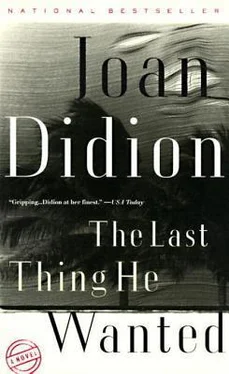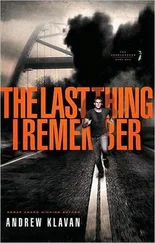Why here, she had asked.
Why not here. He had flicked his headlights off and on several times. I thought you wanted to run into people you know.
There was a pay telephone on the wall by the elevator.
She would call Barry Sedlow.
The first thing to do was get in touch with Barry Sedlow.
As she opened her bag and tried to locate the card on which he had written the 800 number for his beeper she became aware of the desk clerk watching her.
She would tell the desk clerk she needed a drugstore, a doctor, a clínica.
She would get out of this place.
She had seen a bus station on the way to the hotel, the bus station would be open, she could make the call from the bus station.
She did not bother to remember the directions the desk clerk gave her to the clínica but as it happened she passed it on her way to the bus station. That at least was good. This could be going her way. In case anyone was watching she had been walking toward the clínica.
The bus station was almost deserted.
The dispatcher was sleeping noisily in a metal cage above the concourse.
The public telephones in the waiting room had rotary dials and could not be used to leave a message on a beeper, which was the only number she had for Barry Sedlow. Emergencia, she said over and over when she managed to wake the dispatcher. She held out a ten-dollar bill and the KROME GUN CLUB card on which Barry Sedlow had written the 800 number. La clínica. Mi padre. The dispatcher examined the bill and the card, then dialed the number on his pushbutton phone and left as a callback number one of the public phones in the waiting room.
She sat on a molded plastic bench and drank a local cola, sweet and warm and flat, and waited for the phone to ring.
Don’t get your balls in an uproar, Barry Sedlow said when she picked up the phone. You made the delivery, you’ll get the payment. Sometimes these things take a little longer, you got a whole bureaucracy you’re dealing with, they got requisitions, regulations, paperwork, special ways they have to do things, they don’t just peel off cash like guys on the street. Be smart. Stay put. I’ll make a few calls, get back to you. You cool?
All right, she had said finally.
By the way, he had said then. I wouldn’t call your dad. I’m keeping him in the picture about where you are and what you’re doing, but I wouldn’t call him.
It would not have occurred to her to call her father but she asked why not.
Because it wouldn’t be smart, he had said. I’ll get back to you at the Colonial.
It was almost dawn, after she had gone back to the Hotel Colonial and let the desk clerk take her passport and run her credit card, after she had gone upstairs to the single room on the third floor and sat on the edge of the metal bed and abandoned the idea of sleep, before it occurred to her that during the call to Barry Sedlow she had never once mentioned the name of the hotel.
So what, Barry Sedlow said when he finally called back and she put this to him.
Big fucking deal. Where else would you be.
This second conversation with Barry Sedlow took place on the afternoon of June 28. It was the evening of July 1 when Barry Sedlow called the third time. It was the morning of July 2 when, using the commercial ticket provided her, a one-way nonexchangeable ticket to a designated destination, Elena McMahon left San José for the island where the incident occurred that should not have occurred.
Should not have occurred and could not have been predicted.
By any quantitative measurement.
You will have noticed that I am not giving you the name of this island.
This is deliberate, a decision on my part, and not a decision (other writers have in fact named the island, for example, the authors of the Rand study) based on classification.
The name would get in the way.
If you knew the name you might recall days or nights spent on this island en route to or in lieu of more desirable islands, the metallic taste of tinned juice in rum punches, the mosquitoes under the net at night, the rented villa where the septic tank backed up, the unpleasantness over the Jet Ski misunderstanding, the hours spent waiting in the jammed airport when the scheduled Windward Air or BIWI flights failed to materialize, the piece of needlepoint you meant to finish and instead spotted with coconut oil, the book you meant to read and distractedly set aside, the tedium of all forlorn tropical places.
The determined resistance to gravity, the uneasy reduction of the postcolonial dilemma to the Jet Ski misunderstanding.
The guilty pleasure of buckling in and clearing the ground and knowing that you will step off this plane in the developed world.
Little guessing that the pleasant life of the plantations was about to disappear, as the history of the island you dutifully bought at the airport puts it. Paradisaical as the sight of land must have been after the long voyage from the Cape Verdes. Not to overlook the contribution made by early Jewish settlers after the construction of their historic crushed-coral synagogue, so situated as to offer a noteworthy view of Rum Cay. Signalling a resounding defeat for the Party that had spearheaded the movement toward The Independence.
Face it.
You did not, during your sojourns on this island, want to know its history. (High points: Arawaks, hurricane, sugar, Middle Passage, the abandonment known as The Independence.) You did not, if you had planned well, have reason to frequent its major city. (Must see: that historic crushed-coral synagogue, its noteworthy view of Rum Cay.) You had no need to venture beyond the rust-stained but still daunting (school of Edward Durell Stone) facade of our embassy there. Had you discovered such need (bad planning, trouble, a lost passport), you would have found it a larger embassy than extant American interests on the island would seem to require, a relic of the period when Washington had been gripped by the notion that the emergence of independent nations on single-crop islands with annual per capita incomes in three digits offered the exact optimum conditions under which private capital could be siphoned off the Asian rim and into mare nostrum.
Many phantom investment schemes had been encouraged on this island. Many training sessions had been planned, many promotional tours staged. Many pilot programs had been undertaken, each cited at its inception as a flawless model of how a responsible superpower could help bring an LDC, or Lesser Developed Country, into the roster of the self-sufficient NICs, or New Industrializing Countries. On an island where most human concerns were obliterated by weather, this was an embassy in which tropical doubts had been held at bay via the mastery of acronyms.
It was still in 1984 possible to hear in this embassy about “CBMs,” or Confidence Building Measures.
It was still in 1984 possible to hear about “BHN,” or Basic Human Needs.
What could not be obfuscated by acronym tended to be reduced to its most cryptic diminutive. I recall hearing at this embassy a good deal about “the Del” before I learned that it referred to a formula for predicting events developed by the Rand Corporation and less jauntily known as the Delphi Method (that which should not have happened and could not have been predicted by any quantitative measurement had presumably not been predicted by employment of the Del), and I sat through an entire study group session on “Ap Tech — Uses and Misuses” before I divined that the topic at hand was something called the Appropriate Technology movement, proponents of which apparently did not believe that technology developed in the first world was appropriate for transfer to the third. I recall heated discussion on whether the introduction of data processing into the island’s literacy program either could or could not be construed as Ap Tech. Tech skills are in a different basket, an economic attaché kept repeating. Tech skills are a basket-two priority. A series of political appointees, retired contributors from the intermountain West, had passed in and out of the official residence without ever finding need to master the particular dialect spoken in this embassy.
Читать дальше












